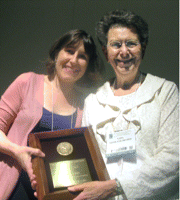How does society form judgments about what "ethical" medical practice looks like? More precisely, what are the factors that determine how society decides that a certain kind of psychiatric or other medical treatment is "acceptable" or "ethical" and another is not?
That's the question that Andrea Tone, Ph.D., winner of this year's Benjamin Rush Award, explored in the lecture "Spies and Lies: Cold-War Psychiatry and the CIA" at APA's 2011 annual meeting in May in Honolulu. She is the Canada Research Chair in the Social History of Medicine at McGill University in Montreal.
Tone described her current research, funded by a grant from the Canadian Institute of Health Research, examining the U.S. Central Intelligence Agency's (CIA) efforts during the Cold War to develop strategies for manipulating mental states and altering brain function.
The code name for this secret effort was MK-ULTRA and involved experiments with surreptitious administration of drugs and other chemicals (including LSD), hypnosis, sensory deprivation, isolation, and various forms of verbal or other types of abuse. The project became public in 1977 after a Freedom of Information Act request uncovered a trove of documents related to the project, which led to Senate hearings that year.
As Tone explained, MK-ULTRA was a priority because it was believed at the time that the Soviet Union, China, or both were actively pursuing mind control and mind-altering strategies, or may have already possessed them. She noted that the large number of American prisoners of war during the Korean conflict who signed statements denouncing the war and calling on the United States to withdraw from the conflict was adduced as evidence that the Soviet Union already possessed tools to control people's minds.
Tone focused especially on the work of American psychiatrist Donald "Ewen" Cameron, M.D. As director of the Allan Memorial Institute ("the Allan"), in Montreal, Cameron received funding from front organizations of the CIA (one of which was named the Society for Human Ecology) to conduct experiments on unsuspecting Canadian citizens.
And many of Cameron's treatment experiments were, to say the least, out of the ordinary. "These CIA-funded experiments … endeavored to treat severe mental illness by de-patterning patients' personalities and impairing their memories through a combination of barbiturate-induced sleep therapy, frequent and high-dose use of electroconvulsive therapy, and the use of pharmaceutical agents such as LSD," Tone said. "It was predicated on the hope that patients' cerebral pathologies could be erased and their brains re-booted."
Today, such experiments are widely condemned. But at the time, Cameron (who Tone says was likely unaware of the fact that the Society for Human Ecology was a front for the CIA) was one of the most highly regarded psychiatrists in North America. He had at various times been president of the World Psychiatric Association, the Canadian Psychiatric Association, and APA. Patients flocked to Allan Memorial for treatment by him, and at his death obituaries celebrated his accomplishments as a clinician and a leader.
So why is he condemned today when he was celebrated then?
Tone argues that Cameron's experiments with "de-patterning" people's personalities and "re-booting" their brains fit well with social and cultural trends at the time in a way that carries lessons for our own time. Those trends included the emerging belief that mental illness was entirely biological in nature and that psychopharmacology was the key to eradicating it, as well as the belief that treatment for mental illness needed to be made more efficient, rapid, and cost-effective.
"Cameron's work in the context of his time not only avoided criticism but garnered accolades," she said. "This took place in an era when people's understanding of psychiatric therapy was being radically revised, when the lines separating experimentation and therapy were blurry, and when custodial mental asylums remained a lighting rod for public criticism partly because taxpayers resented paying to keep these institutions afloat.
"Cameron's determination to find an express path to healing for mentally ill patients by retooling their minds was of interest to the CIA, policymakers, medical colleagues, and patients from around the world because it offered something different to each constituency."
The censure of his work later "reflected how the politics and priorities of a different age reframed what was once called therapy as unacceptable and unethical."

